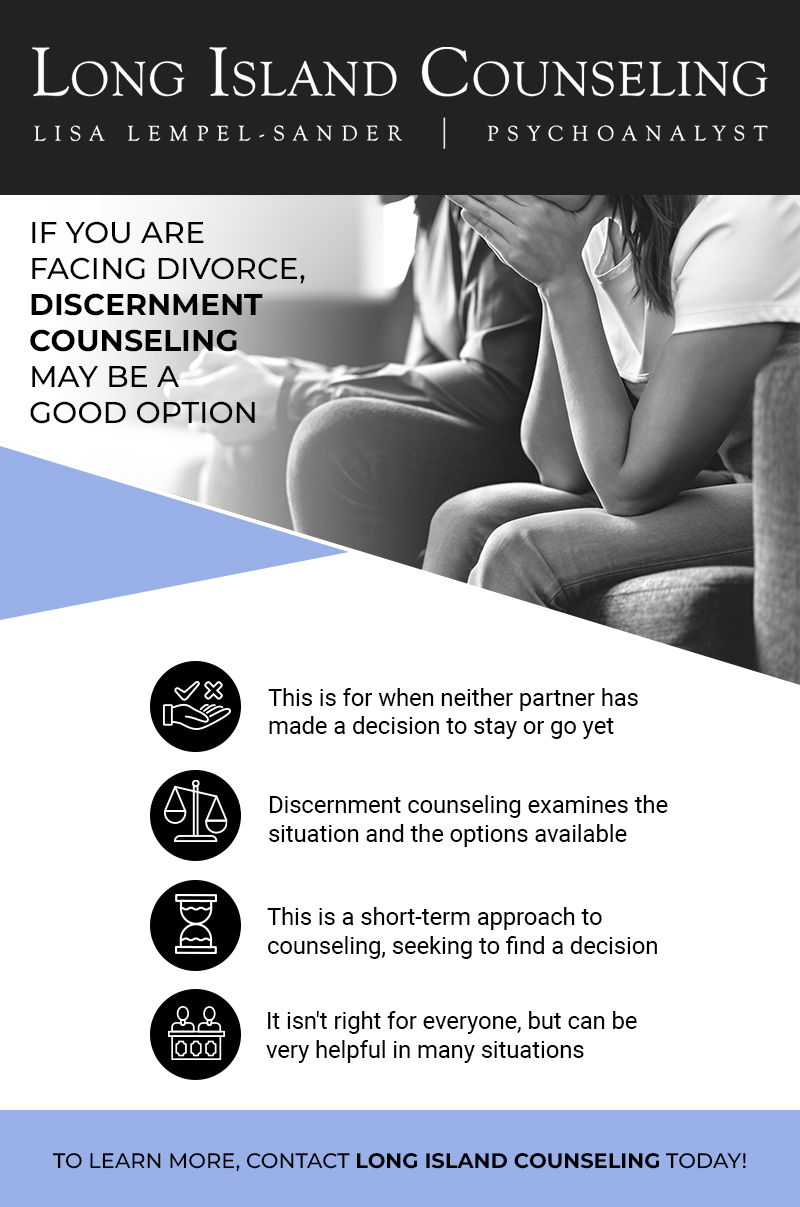How do you know if you want to save your marriage? Discernment Counseling is a therapy that helps you answer this question, serving the couple that hasn’t decided, and needs help making this decision. When you want help with your marriage and need discernment counseling, you can count on the team at Long Island Counseling. Our team will help you to explore all of your options so you can make the best decision for your future. Reach out to us at any time to learn about discernment counseling or any of our other counseling options for couples and individuals.

What is
Discernment Counseling?
Discernment counseling is not marriage counseling. Instead, it respects and recognizes that the couple in crisis is most likely a mixed-agenda couple. This is where one partner is ‘leaning out’ and inclined to leave the marriage and seek divorce. And the other partner is ‘leaning in’ and inclined to stay in the marriage and work toward repair. Often the ‘leaning in’ partner is frightened and desperate as the other becomes more and more ambivalent and disconnected. This frequently causes a great deal of tension because of the uncertainty and anxiety. And there is frequently a great deal of acting out as both partners retreat to their positions in confusion and self-protection.


For When Neither Partner Has
Made A Final Decision
During the process of discernment counseling, the discernment counselor recognizes and respects that neither partner has fully committed to a final decision—divorcing or reconciliation. There is no pre-ordained agenda to promote the dissolution of the marriage or to promote reconciliation. Rather, discernment counseling is specifically designed to help the couple figure out exactly what to do—whether to stay in the marriage or to leave it and divorce.
Discernment Work Includes
Examining A Few Items
When working with a discernment counselor, the couple will be asked many questions as they work through the process. Some of the main points of discernment counseling include:
- Discernment counseling helps each partner understand their role in bringing about the marital dissatisfaction. Gently and respectfully, the treatment works to bring about a deeper understanding of self and the other, and of the relationship as well. The therapy looks at what went wrong and why, how each partner participated in creating the problem, and whether there is a possible narrative for repair.
- Discernment counseling looks to explore the real-life consequences of each option. The couple learns about and discusses the consequences of both reconciliation and divorce. They explore their ideas and thoughts about what each option would feel and look like.
- Discernment counseling provides a safe, neutral, and well-guided space in which to work. While discernment counseling is not traditional marriage counseling, it adopts some of the same important operating principles of working with couples, including neutrality and impartiality, as well as conflict reduction and facilitating honest communication.
It is important that these factors are considered, and the thoughtful counselors at Long Island Counseling will help you with each of these points. We will guide you through the process and work toward honest interactions as we help you seek a resolution to your current situation.
Discernment Counseling is
Not For Everybody
Discernment counseling is not for every couple. It is not an appropriate option if one spouse has already fully made the decision to leave the marriage. It is also not appropriate if there is domestic violence. Domestic counseling is also not the venue to announce your decision to your unsuspecting spouse. However, if both partners are fully committed to the marriage and working toward reconciliation, then discernment counseling is not the right fit either. In this case, traditional marriage counseling would be a better option. Furthermore, if both partners are certain they want to divorce, then discernment counseling is not going to change that decision.


What Should I
Expect?
The short-term approach of discernment counseling helps the partners carefully consider the life-changing decision of whether to end or re-commit to their marriage. When a decision emerges, the counselor helps provide the resources to move forward with reconciliation or move forward with separation and/or divorce.
What If My
Spouse Is Not Interested?
Help is still available even if you are interested in discernment counseling but your spouse is not. This is a common scenario. One spouse is willing to come in for counseling while the other—who is perhaps on the fence about the marriage—is unwilling to commit to treatment. As a ‘mixed-agenda’ couple, you can still benefit from discernment counseling. The leaning-in partner learns how to make positive changes and that may contribute to saving the marriage. The leaning-out partner learns about his or her role in bringing the marriage to the brink and has an honest look at whether the marriage can be fixed or not. No matter what the situation is, discernment counseling can be a good option for many couples who are close to facing divorce. In these cases, you can turn to Long Island Counseling. Our counselors will work with you to help you discern what is best for your marriage.
How Long Does
Discernment Counseling Take?
Discernment counseling is typically a short-term treatment, lasting six to eight sessions. Long Island Counseling can help you schedule these sessions around your busy schedule, finding times that work for you. We know that everyone's situations are different, but we work to help you bring a resolution to your situation so you can both move on with your lives. During these sessions, we will get to know both partners and seek an understanding of the situation. The more honest you are with us, the easier it will be for the discernment counseling approach to be short and effective.


What Happens
After Discernment Counseling?
After discernment counseling, some couples decide to stay together and work on their relationship. Others decide to divorce. And some couples remain undecided. No matter what the outcome is, discernment counseling can help you and your spouse move forward in a healthy way. While not all discernment counseling sessions lead to a final resolution, they can still be a great starting point as the couple continues to discuss options and seek what is best for them.
What Are The
Characteristics Of Discernment?
There are seven attitudes or qualities required for authentic discernment. These include:
- Openness - we must approach the decision in question with an open mind and an open heart.
- Generosity - we must be willing to be generous with our time, energy, and resources in order to discern what is best.
- Courage - we must be brave enough to face the possible outcomes of our decision, even if they are difficult.
- Interior Freedom - we must be free from outside influences in order to make a decision based on our own values and beliefs.
- Habit Of Reflection On One's Experience - we must be able to reflect on our own experiences in order to learn from them.
- Having One's Priorities Straight - we must be clear about our priorities in order to make a decision that is in line with them.
- Not Confusing Ends With Means - we must be able to distinguish between the means and the ends in order to make a decision that is not based on false assumptions.
Discernment counseling can help you navigate these qualities so you can make the best decision for your future. If you are interested in discernment counseling, Long Island Counseling can help. Our counselors are experienced in helping couples discern what is best for their marriage.
Get Started With
Long Island Counseling
Discernment counseling is a process that can help you decide whether to stay in your marriage or get a divorce. It is not for everybody, but if both partners are committed to the marriage and working toward reconciliation, it can be a helpful tool. You can expect to explore the reasons for the marital dissatisfaction and learn about the consequences of both options. Discernment counseling typically lasts six to eight sessions and our counselors at Long Island Counseling can help you schedule these around your busy schedule. If you are interested in discernment counseling, contact us today to get started. We will work with you to help you discern what is best for your marriage. We also offer a variety of other marriage, couple, and individual counseling options. No matter what you are going through, our professional counselors in Long Island are here to help you. If you still have questions about discernment counseling or any of our other options, you can always reach out to our friendly, compassionate staff. We will work with you to find the best options for you. We look forward to hearing from you and helping you find the best resolution for your marriage.





